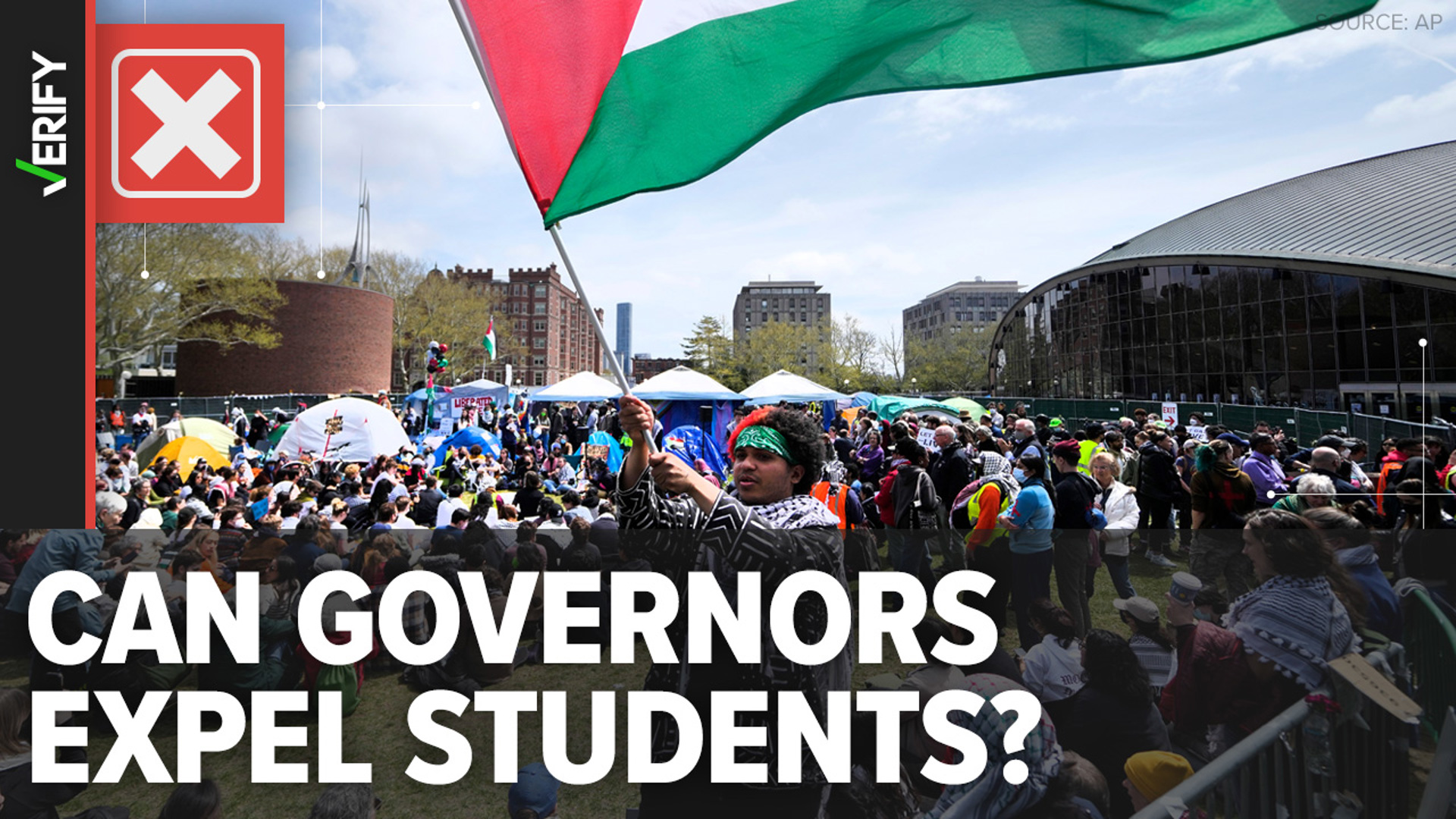Pro-Palestine protests have spread across college campuses in the United States the past few weeks in response to the Israeli military’s ongoing war against Hamas and its impact on civilians in the Gaza Strip.
Multiple governors have reacted strongly to the protests, most visibly Texas Republican Gov. Greg Abbott and Florida Republican Gov. Ron DeSantis.
Abbott posted to X that any students “joining in hate-filled, antisemitic protests” at Texas public universities should be expelled. DeSantis said that protesters that harass Jewish students or staff or otherwise violate appropriate conduct are going to be expelled from Florida’s public universities.
Several viral posts exaggerated what DeSantis actually said, claiming that he pledged to personally "expel all students from Florida schools if they protest Israel."
THE QUESTION
Can a governor expel or suspend students from state universities?
THE SOURCES
- Education Commission of the States (ECS)
- Foundation for Individual Rights and Expression (FIRE)
- Spokesperson for the Association of Governing Boards of Universities and Colleges (AGB)
- Florida State University System
- Florida state law
- March 27, 2024, executive order from Texas Gov. Greg Abbott
THE ANSWER
No, a governor cannot expel or suspend students from state universities. They could, however, pressure or influence a university to enact certain policies regarding student conduct and discipline.
WHAT WE FOUND
Contrary to the viral posts’ claims, neither Abbott nor DeSantis said they would personally expel the students themselves. They wouldn't have the power to do so anyway.
“While a governor may urge a postsecondary institution or university system to consider such actions, the decision to do so ultimately rests with university or system leadership,” the Education Commission of the States (ECS) told VERIFY. “Additionally, a legislature may introduce bills that would essentially constitute a ban on certain student organizations or the expulsion of a student, but the administration of such policies typically remains left up to campus leaders.”
The ECS could not find any examples of states where governors were delegated direct power to expel students or ban student groups. The ECS said another organization it consulted, the State Higher Education Executive Officers Association (SHEEO), was also unaware of any situation where a governor might have such power.
SHEEO noted in its conversation with the ECS that “any efforts to do this by a governor or legislature would intrude on university autonomy and could lead to legal challenges for potential infringements on student 1st Amendment rights.”
Such decisions are primarily made by presidents or governing boards of universities or university systems, the ECS said.
“Typically, the college or university governing board has the authority to expel or suspend students but they delegate that responsibility to the president and administration as part of the management of the institution,” a spokesperson for the Association of Governing Boards of Universities and Colleges (AGB) said. “Colleges and universities have codified disciplinary processes that must be followed.”
In Florida’s case, state law explicitly gives the power to “expel, suspend, or otherwise discipline” students to the presidents of the individual colleges within the state university system.
But even state university presidents cannot decide to unilaterally suspend or expel students. That’s because public universities are government institutions, which means they must offer students their due process rights before they can be suspended or expelled according to the Foundation for Individual Rights and Expression (FIRE).
Even without direct authority to discipline students, governors can still influence university rules, enforcement and decisions.
For most states, members of the board that governs or coordinates the state’s university system are appointed by the governor, according to an analysis by the ECS. In some states, the leader of the state university system or chairman of the board is appointed or approved by the governor.
The Florida State University System has a 17-member board of governors, 14 of whom are appointed by the state’s governor and confirmed by its senate for seven-year terms, the state’s university system says. If a governor serves two terms, like DeSantis, they get to appoint all 14 of those board members.
Additionally, governors and state legislatures can urge, support or introduce legislation meant to influence universities policies on student behavior and how the schools handle student discipline, the ECS said.
For example, on March 27, 2024, Abbott issued an executive order directing state universities to “review and update free speech policies to address the sharp rise in antisemitic speech and acts on university campuses and establish appropriate punishments, including expulsion from the institution” and to “ensure that these policies are being enforced on campuses and that groups such as the Palestine Solidarity Committee and Students for Justice in Palestine are disciplined for violating these policies.”
Many of the nationwide student protests are at private universities, such as Columbia University. Private universities are not run by their state’s government, which means the governor has less influence over these universities outside of applying public pressure.

